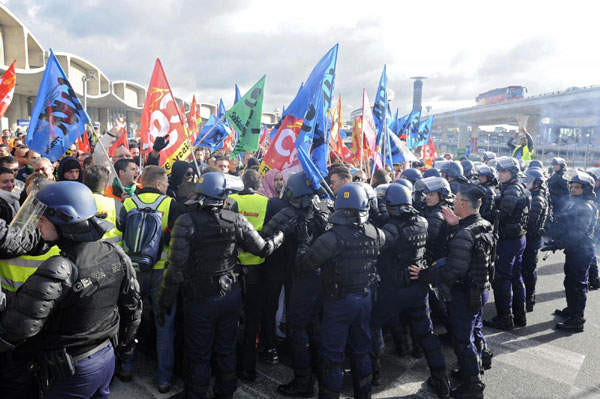France faces more protests
President Nicolas Sarkozy sent in police on Wednesday to clear blockades at France's fuel depots that have caused petrol shortages as unions kept up resistance to an unpopular pension reform due for a final vote this week.
 |
|
French striking workers face the police as they block the Charles-de-Gaulle airport in Roissy near Paris Oct 20, 2010. [Agencies] |
"If this disorder is not ended quickly, the attempt to paralyze the country could have consequences for jobs by disrupting the normal functioning of the economy," the president told a cabinet meeting in remarks released by his office. He vowed again to push through the pension reform.
With a Senate vote expected by the end of the week, trade unions tried to tighten their grip on key sectors of the economy with a ninth day of refinery strikes, go-slows by truck drivers on main highways and work stoppages at regional airports.
The wave of protests, in which at least one million people join marches on Tuesday, or 3.5 million according to unions, has become the biggest and most persistent challenge to austerity measures and economic reforms being enacted across Europe.
Backed by a majority of voters, unions are trying to force Sarkozy -- whose ratings are near record lows 18 months before a presidential election -- to retreat on what is seen as the defining reform of his presidency.
The center-right government has stood firm through a wave of protests and strikes since the summer which gathered momentum last week as unions hit fuel supplies, transport and air travel.
Sporadic protests continued on Wednesday, with groups blocking road access to airports in Toulouse, Bordeaux, Nantes and Clermont Ferrand and rail services still reduced.
"To demonstrate is one thing, to blockade is another. We will not let the country be blockaded," government spokesman Luc Chatel told RTL radio, explaining Sarkozy's order to police.
Yields on French 10-year bonds have risen since the pension protests began in the summer to stand 39 basis points above German benchmark debt from around 26 basis points in May as investors concerned about euro zone deficits and the French demonstrations protests demand a premium for France's debt.
 0
0 






